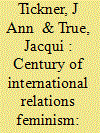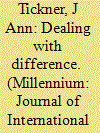| Srl | Item |
| 1 |
ID:
160564


|
|
|
|
|
| Summary/Abstract |
We examine feminism in international relations from the emergence of women's peace pragmatism during WWI to the development of the United Nations (UN) Women, Peace, and Security (WPS) agenda a century later. We argue that feminism did not come late to international relations. Rather, international relations came late to feminism. Moreover, we show how the principles articulated by women peace activists at the 1915 Hague Conference represent distinct contributions to the discipline. These principles reflect a pragmatic approach derived from women's experiences of promoting peace and inclusion. The pragmatism of these principles is echoed by, and further developed in, four pillars of the WPS agenda—as shaped by advocates of women's rights, working through processes of trial and error, to gain state support for advance principles of equal and lasting peace. States may have rejected discussion of women's rights as an appropriate matter for international negotiations in 1915. But with the evolution of women's political rights during the twentieth century, it is now possible to advance a feminist perspective on international peace and security. By recovering neglected aspects of the last century of international relations’ feminism, this article helps further an alternative, pragmatist perspective on ways of knowing and doing international relations.
|
|
|
|
|
|
|
|
|
|
|
|
|
|
|
|
| 2 |
ID:
105924


|
|
|
|
|
| Publication |
2011.
|
| Summary/Abstract |
This address suggests some avenues through which IR scholars from a variety of methodological approaches and different geographical locations might better dialogue with each other in mutually respectful ways. It begins by briefly revisiting IR's great debates since they represent the way the discipline has traditionally defined itself. It claims that these debates have centred on challenging the predominance of a US-centred discipline and its commitment to neo-positivist methodologies. Drawing on postcolonial and feminist literatures, it then offers some suggestions as to how might envisage an IR that is built on more global foundations and on a more pluralist understanding of what we define as scientific knowledge. It concludes with some thoughts on possible paths towards placing different scientific traditions on a more equal and mutually respectful footing.
|
|
|
|
|
|
|
|
|
|
|
|
|
|
|
|